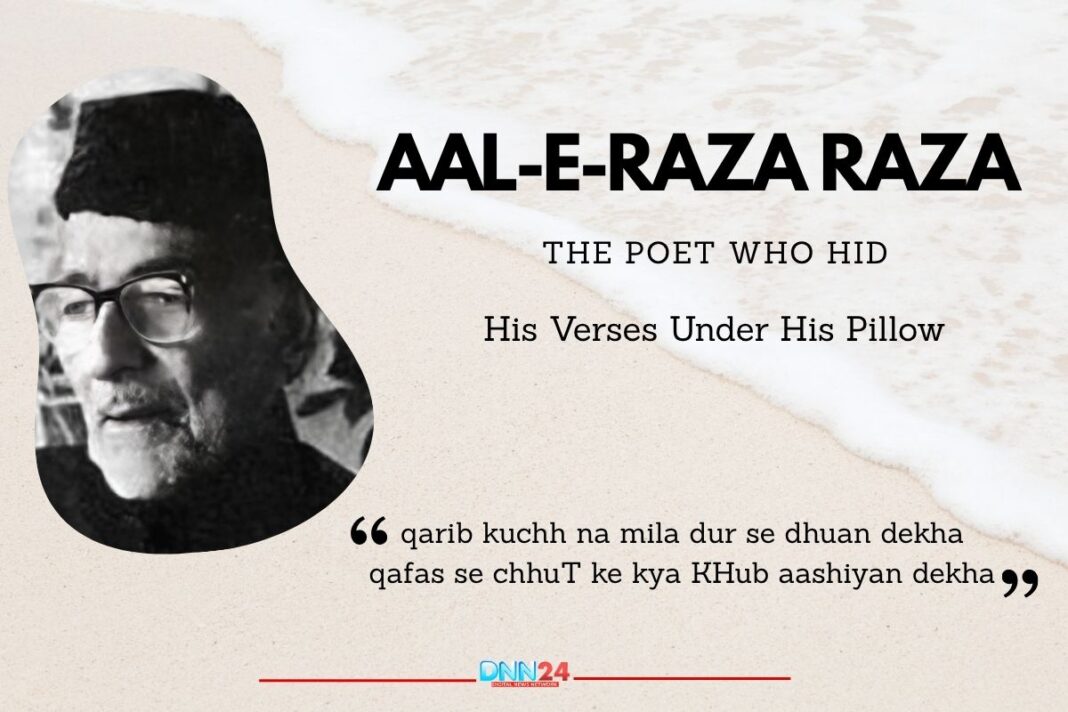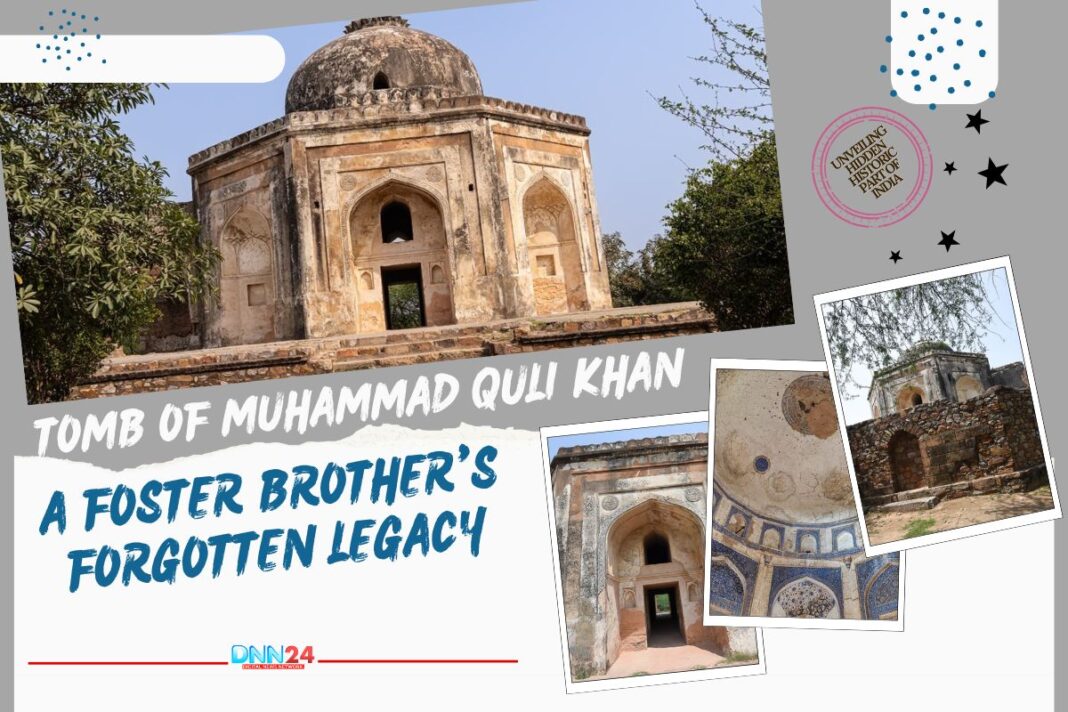What drives a boy to scribble poetry on scraps of paper and hide them beneath his pillow, terrified of what his family might say? For Aal-e-Raza Raza, this secret ritual became the foundation of a literary journey that would transform personal pain into communal healing. His story reveals how a young dreamer from Unnao defied expectations, traded a gold-plated law certificate for a worn diary of verses, and discovered that words could become a means of survival itself.
jo chahte ho so kahte ho chup rahne ki lazzat kya jaano
Aal-e-Raza Raza
ye raaz-e-mohabbat hai pyare tum raaz-e-mohabbat kya jaano
Childhood in Unnao: Seeds of Solitude
The lanes of Unnao in 1896 carried more than dust and daily routines. They had the future voice of Urdu poetry, born on June 10 to Syed Mohammad Raza, a judge whose courtroom commanded respect, but whose son craved something the law could never provide. Young Raza walked those village paths collecting fragments of human stories, observing dramas at the chai stall, absorbing the texture of ordinary lives that would later fill his ghazals with authentic emotion.
un ke sitam bhi kah nahin sakte kisi se hum
Aal-e-Raza Raza
ghuT ghuT ke mar rahe hain ajab bebasi se hum
His childhood unfolded in contradiction. The household expected him to follow his father’s dignified footsteps, yet poetry pulled at him with a force he could not name or resist. He wrote in secret, crafting lines on whatever paper he could find, concealing them like stolen treasures beneath his pillow. This hiding reflected deeper fears about expressing himself in a world that valued practical professions over artistic pursuits.
yahi achchha hai jo is tarah miTae koi
Aal-e-Raza Raza
aap bhi phir mujhe DhunDe to na pae koi
The turning point arrived during a local festival when Raza gathered enough courage to recite his first couplet before villagers. Their response was not admiration but gentle mockery, laughter that might have crushed a fragile spirit. Instead, Raza absorbed their ridicule as instruction, understanding that his voice needed refinement, not abandonment.
allah nazar koi Thikana nahin aata
Aal-e-Raza Raza
aane ko chale aate hain jaana nahin aata
He transformed embarrassment into determination, using their dismissal as fuel rather than defeat. This early lesson in resilience shaped his entire approach to poetry, teaching him that vulnerability could be harnessed as a source of strength. The Unnao years planted seeds of solitude that would blossom into verses marked by innocence, courage, and an unflinching commitment to emotional truth.
Student Life: Early Struggles and Literary Discovery
The walls of Canning College in Lucknow witnessed an unusual sight between 1912 and 1916: a student retreating from law lectures to read ghazals aloud in the gardens, his audience comprising attentive squirrels and chirping birds rather than fellow students. Raza’s peers saw him wasting time on couplets while they pursued serious studies. His family pushed him harder towards the law, insisting that poetry was no profession for a respectable man’s son.
hamin ne un ki taraf se mana liya dil ko
Aal-e-Raza Raza
wo karte uzr to ye aur bhi garan hota
The pressure intensified when Raza enrolled for his LLB at Allahabad in 1920. He sat through rigid legal theory, mechanically absorbing statutes and precedents. Still, his real education happened in the margins of his law books where he scribbled verses that rebelled against the very order his studies represented. Each couplet was a small act of defiance, a whispered insistence that his true calling lay elsewhere
Then came the moment that defined everything.
mayus KHud-ba-KHud dil-e-ummid-war hai
Aal-e-Raza Raza
is gul mein bu KHizan ki hai rang-e-bahaar hai
After completing a gruelling examination, Raza made a transaction that his family would never understand and that he would never regret. He traded his gold-plated law certificate to a fellow poet for a worn diary filled with shayari. That exchange marked the invisible border crossing from obligation to authenticity, from what others demanded to what his soul required. Poetry ceased being a hobby and became a matter of survival itself.
aaj yun dil ne un ka nam liya
Aal-e-Raza Raza
jaise girte hue ko tham liya
Moving to Pratapgarh provided distance from familial expectations and proximity to his authentic self. There, he began writing with genuine dedication, corresponding with the respected Aarzu Lakhnavi, who guided his artistic development through letters that arrived like lifelines.
qismat mein KHushi jitni thi hui aur gham bhi hai jitna hona hai
Aal-e-Raza Raza
ghar phunk tamasha dekh chuke ab jangal jangal rona hai
These student years taught Raza that adversity sharpens words, that struggle can refine rather than destroy. His poetry grew stronger precisely because it had to fight for existence. The balance he sought between ordinary duties and extraordinary calling would echo through every line he later shared with the world.
The Shaping of a Voice: Triumphs and Tragedies
Between 1921 and 1927, Raza practised law in Lucknow and Pratapgarh, but his real education continued in the stories clients brought to his office. They arrived carrying tales of loss, injustice, unrequited love, and stubborn hope. Raza listened not just as a lawyer but also as a poet, absorbing the texture of their experiences and understanding how grief and beauty coexisted in daily existence. These encounters filled his ghazals with authentic human emotion rather than abstract philosophical musings.
tum ko to kabhi dil se bulana nahin aata
Aal-e-Raza Raza
hum aa ke jo baiThe hain to jaana nahin aata
The year 1939 marked a watershed moment at a respected gathering in Lucknow, where Raza recited his first Marsiya. The hall fell silent as his voice gave shape to an elegy about grief and resilience. Listeners remember the profound stillness, the way his words seemed to speak directly to each person’s private sorrows. That performance announced the arrival of a mature poetic voice capable of transforming personal pain into communal understanding.
ab hum ko kisi se koi shikwa na rahega
Aal-e-Raza Raza
jab tum na rahe koi hamara na rahega
Yet success never came easily. Raza faced repeated rejection when trying to publish his first collection, Nawa-e-Raza. Publishers dismissed his work, questioning whether his voice mattered in an already crowded literary landscape. Those nights of rejection drove him to Lucknow’s Imambara, where he found solace among ancient walls and echoing prayers. He wrote in solitude, using the spiritual atmosphere to strengthen his resolve rather than surrender to doubt.
ek chah ki nigah ka afsana ban gaya
Aal-e-Raza Raza
wo ungliyan uThin ki main diwana ban gaya
Finally, in 1944, both his Marsiyas found publication, marking official recognition of his talent. However, the recognition mattered less than the journey that led to it. Through professional setbacks, urban loneliness, and constant struggle, Raza remained faithful to his craft. His famous lines about unspoken sorrow and quiet endurance resonated because they emerged from genuine experience, not intellectual exercise. He proved that personal tragedy could fuel communal healing, that one person’s honest expression of pain could become another’s source of comfort and strength.
Legacy: Inspiration and Impact on Urdu Poetry
Aal-e-Raza Raza’s influence extends far beyond the pages of Nawa-e-Raza and Ghazal-e-Moalla. His works captured vivid realities that gave voice to those silenced by circumstance, proving that poetry could speak for people who lacked their own platforms. At mushairas across India, listeners discovered in his verses a mirror for their own struggles, finding permission to acknowledge pain they had been taught to hide.
raat guzri phir andhera chha gaya
Aal-e-Raza Raza
apna suraj din chaDhe gahna gaya
One deeply personal story illustrates his unique approach to healing. When a close friend fell gravely ill, Raza spent nights at the bedside, weaving couplets as comfort, using poetry as medicine when conventional remedies failed. This ritual demonstrated his belief that words possessed genuine power to soothe suffering, that art served practical purposes beyond aesthetic appreciation. His social poetry highlighted injustice and unity, sparking quiet internal revolutions among readers who recognised their own experiences in his lines
tari sukhe hue honTon pe aa jaane se kya hoga
Aal-e-Raza Raza
bahut tarse hain saqi ek paimane se kya hoga
In his later years, Raza devoted energy to charitable causes, using poetry as a refuge for distressed souls who sought him out. He never hoarded his gift but shared it generously, understanding that his talent came with a responsibility to serve others. His verses embraced sorrow and joy with equal grace, refusing to pretend that life was simpler or more beautiful than it actually was.
na rakkha kahin ka na apna banaya
Aal-e-Raza Raza
wo kya chahte hain samajh mein na aaya
Today, new generations discover in his work a map for navigating life’s shadows, a guide for transforming personal battles into shared beauty. Aal-e-Raza Raza stands not merely as a poet but as proof that honest emotional expression requires courage, that the voice hidden beneath childhood pillows can eventually echo across decades. His legacy reminds us that what begins in solitude and rejection can mature into strength and recognition, that the words we write in our darkest moments might someday light the way for others walking similar paths.
Also Read: Saqi Farooqi: The Rebel Poet Who Kept Urdu Alive in London
You can connect with DNN24 on Facebook, Twitter, and Instagram and subscribe to our YouTube channel.



